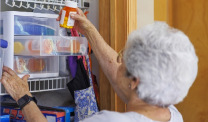What’s the Best Way to Offer a Mesothelioma Caregiver Help?
Cancer & CaregivingWritten by Dana Nolan, MS, LMHC | Edited By Amy Edel

Family Caregiver Awareness Month may be coming to an end, but our hope is to inspire recognition of and support for those who are caring for loved ones with mesothelioma and other serious conditions throughout the year ahead. And we hope to encourage caregivers to prioritize their own self-care as well.
By definition, a “caregiver” is one who gives care to others, which means their thoughts and energy are focused on another person’s needs and well-being, not their own. Family caregivers of mesothelioma patients are typically unpaid and emotionally attached to the person they are caring for.
It’s quite common for mesothelioma caregivers to feel stressed and overwhelmed with caregiving duties. These duties often happen alongside other obligations such as working outside the home, running a household or caring for children.
Caregivers can usually manage to put their own physical and emotional health needs on the backburner for a short period of time while they focus their energy on their loved one with mesothelioma. However, over time, they can begin to experience physical and emotional symptoms that can negatively impact their quality of life and ability to be a caregiver.
How to Offer Caregivers Help
Sometimes, well-meaning friends or family say, “Let me know if there is anything I can do.” This can sound vague as the caregiver may not know what is too big a favor to ask. If you want to offer help to someone with mesothelioma or their caregiver, think of specific favors you’re able to do and offer to them.
It can also be helpful to ask for a list of everyday tasks or chores. Then you can tackle tasks you’re able to help with, and you can delegate tasks to other people who offer help.
- Driving their loved one to a scan appointment
- Going to the grocery store
- Mowing the lawn
- Picking up prescriptions
These tasks can be easily shared among a group of people who want to be helpful and show their support to the person with mesothelioma and the family caregiver. Not all caregiving duties are created equal, and it is helpful to make a list of tasks the primary caregiver doesn’t necessarily have to do on their own.
Some caregivers struggle to either ask for help or accept offers of help from family and friends. Family caregivers may see their caregiving duties as a reflection of the depth of love for and concern about their loved one with mesothelioma. This can lead caregivers to believe they must provide all the care and companionship or their loved one with mesothelioma.
Why Is Self-Care Important for Caregivers?
When a caregiver neglects to get enough sleep or exercise, does not maintain a healthy diet, neglects their own medical care and doesn’t make time for some socialization, the result is the caregiver can begin to feel poorly. While it may seem there is just not enough time to prioritize their own needs, mesothelioma caregivers need to do so or risk becoming emotionally overwhelmed or physically sick.
- Fatigue
- Irritability
- Poor concentration
- Poor memory
- Weakened immune system
Taking an hour or two each week may be all that is needed to avoid caregiver burnout. Be sure to address your own physical health such as attending your annual physical exam.
Tending to your mental health is also critical. Have a quick coffee break with an old friend. Connect with other mesothelioma caregivers. Our monthly virtual support group is a great way to give and receive support from the privacy of your own home. Our private Facebook group exclusively for mesothelioma caregivers is also a helpful resource.






